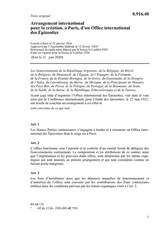International Agreement for the creation of an Office International des Epizooties
The World Organization for Animal Health (WOAH) tracks and reports epizootic disease outbreaks, sets animal health and safety standards, and provides technical support for infrastructure development and outbreak response. WOAH was titled the Office International des Epizooties (OIE) until 2003, and changed its acronym to WOAH in 2022. WOAH regularly updates a public tracker documenting epizootic outbreaks and efforts to contain them.
| Opened for signature | 25 Jan 1924 |
| Entered into force | 25 Jan 1924 |
| Latest update | 11 Jun 2020 |
| Available languages |
States parties
Twenty-eight states were signatories of the international agreement, which, upon ratification, created the Office International des Epizooties (OIE) on 25 January 1924. The agreement to establish the organization enters into force on the same day it is ratified for all states parties except for the following countries which submitted declarations of accession after it had already entered into force in those countries: Algeria, Cameroon, Madagascar, and Zambia.
Country | Status | Signed | Ratified | Entered into force |
|---|---|---|---|---|
| Afghanistan | Party | 25 Jul 1960 | 25 Jul 1960 | |
| Albania | Party | 11 Feb 1991 | 11 Feb 1991 | |
| Algeria | Party | 13 Feb 1969 | 3 Jul 1962 | |
| Andorra | Party | 16 Jan 1998 | 16 Jan 1998 | |
| Angola | Party | 6 Apr 1979 | 6 Apr 1979 | |
| Antigua and Barbuda | Non-party | |||
| Argentina | Party | 25 Jan 1924 | 20 Oct 1933 | 20 Oct 1933 |
| Armenia | Party | 29 Dec 1997 | 29 Dec 1997 | |
| Australia | Party | 9 Feb 1925 | 9 Feb 1925 | |
| Austria | Party | 30 Jun 1928 | 30 Jun 1928 |
Party
The state has accepted, approved, ratified, or is otherwise party to the agreement, indicating consent to be bound to the agreement.
Signatory
The state has signed, but not yet ratified or become an official party to the agreement. Where the signature is subject to ratification, acceptance or approval, the signature does not establish the consent to be bound. However, it is a means of authentication and expresses the willingness of the signatory state to continue the treaty-making process. The signature qualifies the signatory state to proceed to ratification, acceptance or approval. It also creates an obligation to refrain, in good faith, from acts that would defeat the object and the purpose of the agreement.
Non-party
The state has not taken any actions with regard to the agreement.
Associate member
The state may have requirements for some of the statutory or non statutory aspects of an agreement, but would not confer all of the obligations of the agreement on the member. Associate members may not have voting rights.
Observer
The state is non-party to an agreement, but has the ability to attend meetings or other discussions, and otherwise participate in activities. Observers may be granted permission to speak at formal meetings.




